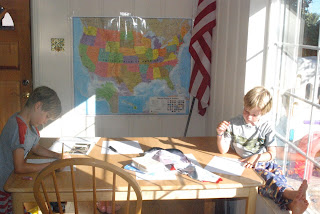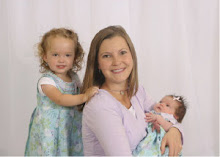Worst advice: The book Baby Wise – newborns should feed on demand, not on a schedule.
Jen's book suggestion: Child of Mine: Feeding with Love and Good Sense, by Ellyn Satter
Jen, a registered dietitian with a masters degree in dietetics, is the mother of two, darling young girls.
 “Having both hands free is a must with two kids,” says Jen, and that is why she opted for the back-pack diaper bag.
“Having both hands free is a must with two kids,” says Jen, and that is why she opted for the back-pack diaper bag.  Her versatile charcoal colored diaper bag is filled with the usual essentials plus Shout Wipes, though Jen assures me Oxy Clean To Go works better.
Her versatile charcoal colored diaper bag is filled with the usual essentials plus Shout Wipes, though Jen assures me Oxy Clean To Go works better. 
As a dietitian, Jen has great snack ideas for kids and moms alike. “Fresh is best,” she says, and taking the time to slice apples or pears is preferred to processed gummy-fruit snacks and granola bars.

My Ella loves carrying a Ziploc bag of “Fruit Loop” cereal – Jen suggests making Ella’s cereal snack a little healthier and less sugary by adding Cheerios or Kix to the mix.
 Great idea!
Great idea!Snack favorites Jen serves her kids on the go: raisins, nuts, whole grain crackers, sugar snap peas, peanut butter sandwiches and baby carrots.
A carrot cooking tip Jen passes on: soften the carrots by steaming them for a few seconds in the microwave. It is easier for little hands and mouths to eat the carrots when they are softened.
 Whenever possible avoid excess sugar and processed snacks. If you are in a hurry, grab fruit you don’t need to cut like a banana or orange (don’t forget a baggie for the peel).
Whenever possible avoid excess sugar and processed snacks. If you are in a hurry, grab fruit you don’t need to cut like a banana or orange (don’t forget a baggie for the peel).Important food advice:
1. Make your own baby food - no preservatives, it’s healthier and less expensive.
2. Expose children to a variety of foods, have them eat what you eat rather than hot dogs and dino-nuggets.
3. Parents should decide when, where and what food is offered. The child should be allowed to decide how much they want to eat and whether they will eat it.
4. Never force a child to eat.
5. Never offer food as a reward (“if you sit down you can have candy”) because parents should not create moral associations with food. Plus, by keeping food 'neutral' you allow children to maintain their natural ability to determine if they are full or hungry, and reduce the risk of future eating disorders (like obesity and anorexia).
6. Have your child sit at the table with you in a booster or high-chair rather than in the corner. Making the child part of meal time allows them to feel more connected with the family, and to have positive associations with meal time.

7. Set appropriate table manners and limits. For example, in their home, Jen says if her daughter throws or dumps food she is not allowed to stay at the table and meal-time is over.
Fortunately for Jen, dietetics and motherhood go hand-in-hand. “Family time isn’t compromised by my work,” she explains. “I see clients while my children are napping or on Saturdays.”
Since food and nutrition are important to Jen, she invests time in menu planning and weekly grocery shopping lists. Meal planning helps Jen make sure her family is getting plenty of fruits and vegetables.
Advice for parents of picky eaters?
Maintain and honor separation of responsibility - see points 3 and 4 above. "When a child refuses to try something, or will only eat hot-dogs, it is generally more about them wanting to exert their own independence and push boundaries and less about the food," Jen assures me.
A child will not willingly starve themselves, and Jen says if you offer healthy food at consistent intervals throughout the day, eventually your child will eat the good stuff. Your child will learn to trust you as you offer enough opportunities to eat balanced foods. Children will also learn that you are responsible (not them) for what is offered. "Young kids don't know what balanced nutrition is," says Jen. "That is why it is important that parents do not let their children dictate what is served at meal time."
At each meal offer you child food you know they are comfortable with, like bread or a favorite fruit. Also introduce at least one new food. "They don't have to like it and at first they might be angry about the new food since kids love consistency. But, in time they will accept it on their plate, eventually touch it, and even try the new food." As long as there is something they know and are familiar with on their plate in addition to a new food, you will eventually help your child have courage to try new things, or at least feel comfortable with different foods on their plate.
"Don't stress if each meal isn't completely balanced," says Jen. "As long as you keep offering a variety of healthy food, over the course of several days you child will have all their nutritional needs met."
A final suggestion for helping children feel safe with new foods is to do a three week menu cycle. That way your child will have variety (three weeks worth) and opportunity to become familiar with new foods (the cycle repeats).
Satter














